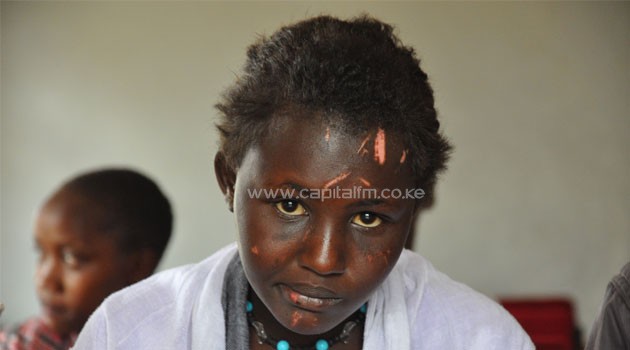Violence Against Women
Source: CapitalFM
Naima Nguruki and Jacqueline Shongo are about 10 years old but at such a tender age, the brutality of Female Genital Mutilation (FGM) and forced early marriage have separated them from their families.
It was in April this year when Shongo heard her father tell her mother that he had identified a man to pay dowry for her. The discussion sent cold chills in Shongo.
She knew she would undergo the cut the next season of the Maasai cultural practice that marks the transition of girls to womanhood.
"I was in the house when I heard my father telling my mum that he had identified a husband for me. Marriage for us means that a girl has to undergo the practice for her to become a woman, then a wife. I knew my mum was being informed to prepare for me to undergo the cut," she recalls.
Shongo is bold and ambitious. Her eloquence as she narrates her episode demonstrates her willpower to achieve her dreams of becoming something better than a wife at the tender age of 10.
Despite her age, she has never been to school, but Shongo confidently says she can speak Swahili. However, as soon as the interview begins, she opens her narration with only two Swahili words before switching to fluent and fast Maasai trying to convince me to also understand her. A translator comes to our rescue.
Since she learnt of her parents plan, she kept calm knowing that the next season of FGM will be in August.
'We are in July. I knew I had to look for a way of running away before August. I have my best friend Nguruki. I knew she also did not want to be cut," Shongo says.
Nguruki, 11, is Shongo's best friend and has also defied cultural practices to bravely defend her childhood rights.
"We do many things together; we graze our goats together and fetch firewood together," Nguruki explains. "Shongo came running. She told me why we had to run away. We ran until we got to the main road where we could hike a lift. We stopped a lorry that was ferrying potatoes to Narok town and explained to the driver why we were escaping and he agreed to take us to town."
The children had never been to Narok town before, but they were armed with bravery and were able to ask around until they located Shongo's aunt who runs a business in town.
The two were taken to Tasaru FGM Rescue Centre in Narok, a place they will call home and thank for making their dreams of going to school come true despite the early separation from their families.
Nguruki and Shongo escaped FGM and early marriage by sheer luck.
But even as Shongo is happy to be at the safe house, she feels sorry for her two younger sisters aged four and six.
"I wish my two sisters will escape the cut. My two older sisters were cut and already married off. The same may happen to the younger ones if they don't run away."
15-year-old Esther Fadira was unlucky after she underwent the cut at the age of 14. Fadira arrived at Tasaru rescue centre last Monday.
She is timid and it is difficult to hear her during the interview but through the help of a translator, Fadira in a hushed voice slowly narrated her agony in the hands of her parents.
 15-year-old Esther Fadira was unlucky after she underwent the cut at the age of 14.
15-year-old Esther Fadira was unlucky after she underwent the cut at the age of 14.
Fadira arrived at Tasaru rescue centre last Monday/MUTHONI NJUKI
The physical scars inflicted on her face are subtle compared to the emotional trauma she has undergone in the name of cultural practices.
Her smooth black beautiful face bears pink marks of deep wounds and cuts meted on her by a man supposed to be her husband.
"My uncle brought the man who was to marry me. I saw him for the first time on that day. They told me that I was to become his wife. I refused but he caught me and beat me up using his stick," Fadira narrates as she recounts the nasty ordeal of being roughed on her entire young body with her parents watching and doing nothing about it.
Though Fadira was rescued by Tasaru, the scars on her young face will remain a constant reminder of acts committed by unscrupulous men in the name of marrying underage girls to fulfil cultural demands.
But the scars will also remind her of the day she got a chance to go to school at the age of 15.
The practice of FGM continues to be an eyesore that has robbed young girls of their youth, health and education.
While major focus on FGM is on the Maasai community in Kenya, North Eastern region which is dominated by the Somali takes the lead with 97.6 percent of girls undergoing the cut. Kisii region follows closely at 96 percent then Kuria and Pokot which also have over 90 percent of girls undergoing FGM.
The Maasai community is at 76 percent, Embu 51 percent and Meru at 45 percent.
Despite Kenya having the Children's Act 2001 and the Prohibition of FGM Act 2011, the cultural practice continues to mess the lives of young girls and lead them to forced early marriages.
